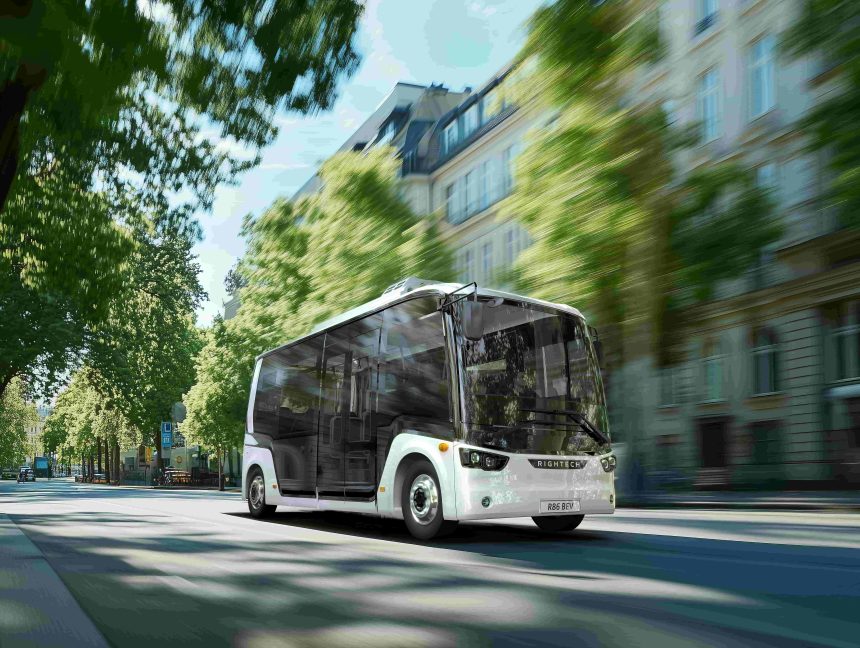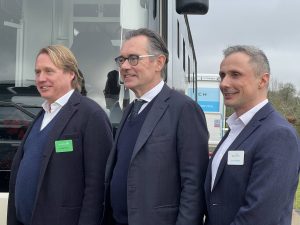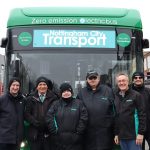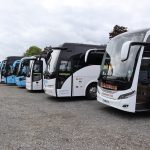January marked a fresh direction for Wrightbus as it launched a new range of light battery-electric vehicles (BEVs) via partnerships with two Chinese manufacturers, including coach and bus specialist King Long.
That included a light battery-electric truck in both right- and left-hand drive and a pair of battery-electric buses. All were unveiled last month at the Bamford family’s farm and estate, accompanied by observations around ambitions for global growth and a need for an expedited rollout of zero-emission solutions in the UK.
But many members of the audience pointed out that this is not the first time a supplier or manufacturer has collaborated with a Chinese manufacturer on a light electric bus — so what makes this time different? According to Wrightbus, this particular Chinese white label brand — meticulously selected to meet Wrightbus standards — will stand out from previous attempts because the Wrightbus name is behind it, alongside a warranty, maintenance package, the brand’s service network, and over 100 field technicians.
Flexible on paper
King Long is the official partner for the bus side of the venture — a separate Chinese manufacturer is supplying trucks — and so far options include a 6m model, the RB6, and a 9m model, the RB9.
According to Wrightbus, the vehicles have undergone “30,000 hours of fine-tuning” — testing, homologation, designing and validation — by its own engineering team. Both are said to be very customisable.
The RB6 is motivated by an 89kWh battery achieving a range of at least 112 miles/180km, and can be charged from 20-80% in 37 minutes. Passenger capacity is 22.
The larger RB9 can carry 57 passengers and is fitted with a 282kWh battery achieving a claimed range of 187 miles/300km. Charge time for that vehicle is 84 minutes.
Wrightbus promises a total cost of ownership saving over diesel of 11% for the RB6 and 7% for the RB9. Both will be “competitively priced” against existing alternatives.
The vehicles are backed by a two-year, 200,000km vehicle warranty, a three-year, 100,000km warranty for the e-drive system, and an eight-year, 400,000km warranty for the battery.
Four orders for the RB6 have already been confirmed. Speed of delivery is a point of focus for their introduction, and lead times are said to be approximately 4.5 months.
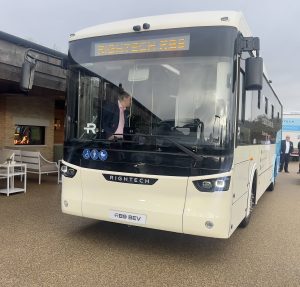
The idea to introduce the smaller buses under Rightech came about in the middle of 2024 during the launch of NewPower. As well as competitive pricing, Wrightbus service, parts insurance, technical expertise, and route modelling clinched the notion that the strategic partnership approach would deliver the best offering.
According to Jean-Marc, there’s also the fact that Wrightbus could not build 6m and 9m buses competitively in Europe.
“We found in King Long a company that wanted to partner and which was hungry for the European market,” he explains, “but at the same time, it didn’t have the scales to do that. We therefore reworked and engineered its own 6m and 9m buses, named them with our own brand and sold them under our own service, with our own warranty in the UK and in Europe.”
He also believes that King Long was best suited to Wrightbus in terms of “competence, product, and in terms of the chemistry between the leading figures” of the two companies. “There is no hiding that China is leading the way,” he adds. “Why not partner, in the sense that we source the Chinese product, refine it, re-engineer it, and distribute it under our impeccable service?”
Some will note that King Long has prior history in the UK, and that history may influence opinion. Acknowledging that, Jean-Marc notes that Wrightbus, acting in its capacity as an OEM, can avoid the types of challenges historically experienced by importers. “We do the sale ourselves,” he says. “We do the service ourselves. We know the bus inside out; there is nothing Jon Eardley at AllServiceOne does not know about it. That’s what companies didn’t have years ago when they came to the UK; we know [China] is leading in electrical drivetrains, so we paired its low-cost competence with our competence in aftersales and engineering.”
The target market for the vehicles? A healthy mix of private and large fleets. The RB6 is anticipated to be popular in the South of England and London. The versatility of the RB9 led to expectations it would be initially more popular — a 300km range makes it suited in both a city and rural setting — though it is in fact the RB6 that currently leads the way in orders.
Global ambitions
Growth, growth, growth is the noise coming from Wrightbus right now. In a presentation accompanying the launch, owner Jo Bamford noted that Wrightbus is the fastest growing bus manufacturing business in Europe. It will employ 2,400 people this year, and since Mr Bamford acquired the brand in 2019, it has gone from manufacturing a product range 95% of which was powered by diesel to now 95% zero-emission. It now hosts factories in Northern Ireland and Malaysia, and has established service centres across the UK, Northern Ireland and Germany.
Ostensibly, January’s event was about the launch of a new range of light BEVs, but there is more nuance than that. Jo himself acknowledges that to compete effectively on a global scale Wrightbus must set out a unique proposition as a European manufacturer. That proposition is “seamless decarbonisation”, and the evidence is plain to see; Wrightbus has established a holistic end-to-end solution for a potential customer. Wrightbus builds new buses, NewPower repowers older buses. AllServiceOne supports them; Ryze Power — Jo’s portfolio of net-zero companies — supplies turnkey charging and infrastructure solutions, the energy to run them, and the financial options to sell them. Ambitions exist for a very expansive network.
“We have a wonderful opportunity in Europe to look at this energy transition and get it right,” he says. “China has done a brilliant job. It has an 85% market share of batteries; it has thought about this as a whole solution. Everything we do here is modelled on what China did with batteries — we have got to think about this as a holistic whole.
“Becoming a market leader in your own region then gives you the springboard to go around the world. Should we build everything in the UK? No, we are going to operate on a global basis and we need to move where plants are close to customers and where there is expertise.”





















